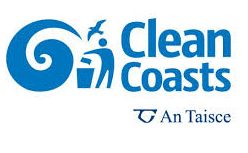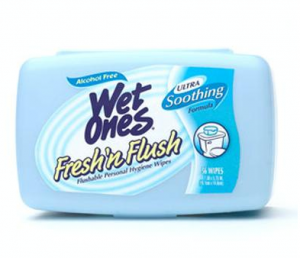To Flush or Not to Flush? The outrageous fortune of wet wipes is causing us a ‘sea of troubles’
7th April 2017
‘Think before you flush’ has been the motto of An Taisce’s Clean Coasts for some time but now wily manufacturers are muddying the waters of what is and what is not a ‘flushable’ item. This new development may have tremendous implications for consumer behaviour, our sewage system and for the environment, writes David Hayden.
The problem caused by non-biodegradable wipes being flushed down our toilets is becoming a major concern. Changes in consumer behaviour has led some manufacturers to actively label their wet wipes as ‘flushable’. As a result, these wipes are wreaking havoc on our sewer systems and coasts.
A new trend appears to be to replace ordinary toilet roll with wet wipes that many people believe to be flushable, often as a result of directions on the wet wipes containers themselves. Whereas they had previously been used for baby care, these wipes are becoming increasingly popular as personal care products for adults. And herein lies the problem.
Baby wipes -which, according to The Guardian, spearheaded the wipes revolution – represented a simpler disposal problem. The wipes would be used during nappy changes and binned along with the soiled nappy into the solid waste stream. However, this tends not to be the case for adults who use wet wipes.
Cynthia Finley, Director of Regulatory Affairs at the National Association of Clean Water Agencies has found that adults are usually very reluctant to throw wipes they use for themselves into the solid waste stream. As a result there is a demand for wipes that are flushable and manufacturers have responded by marketing ‘flushable’ wipes.
The apparent logic of the ‘flushable’ wipe is that they don’t contain the microplastic fibers found in most wipes. However, this does not prevent these so called ‘flushable’ wipes from wreaking havoc on sewer systems, not to mention being washed up on beaches. Unlike toilet paper which begins to break down in minutes, these wipes have been shown to be fully intact even after months of saturation.
The fact that some wipes are labelled ‘flushable’ while others are not has led to confusion among consumers. Furthermore, the voluntary code of ethics drawn up by the International Nonwovens and Disposables Association and the European Disposables and Nonwovens Association has often resulted in ‘do not flush logos’ being put in difficult to spot areas, such as the underside of the package.
These wipes clump together in sewers and rivers and can become entangled with other substances such as congealed grease from cooking disposal, becomeing what is known as sewer ‘fatbergs’. Wipes were a major factor in the developing of London’s notorious 15 tonne fatberg that nearly flooded the city’s sewer system in 2013.
In countries such as the US and the UK problems resulting from these wipes have garnered significant media coverage but as of yet there is no legislation in place to deal with the issue in either country. New York State currently has a bill in its Assembly Committee, which, if passed, will prohibit the labeling or advertising of a “non-woven disposable product for sale as flushable” without prior approval. It is hoped that this bill will be passed so that others will follow across the US.
New evidences suggests that the problem is getting worse in Ireland, both in terms of costly sewer blockages and coastline litter. Smaller fatbergs such as the one pictured below blocked sewers in Castleisland, Co Kerry and resulted in a discharge of effluent into the Mulaghi river. The Kerry County Council and the EPA who investigated the incident last September, reported that flushed wipes that failed to disintegrate were the cause.
[x_image type=”none” float=”none” src=”https://greennews.ie/wp-content/uploads/2017/04/sewer-fat-berg-scotland.jpg” info=”none” info_place=”top” info_trigger=”hover”]
The Coastwatch autumn survey for 2016 will be out this Sunday and will report that surveyors in Fingal and Cork counted 20 wipes and 104 baby wipes respectively. A copy of the report, which has been seen by The Green News, states:

[x_blockquote type=”left”]”Wet wipes and strings of them caught on sticks were mentioned for the first time. Follow up work showed that at least some manufacturers label these wipes as ‘flushable’ on the packaging’” [/x_blockquote]
The report will be available on Coastwatch’s website this Sunday, April 9: http://coastwatch.org/europ
e/survey/
[x_author title=”About the Author”]









